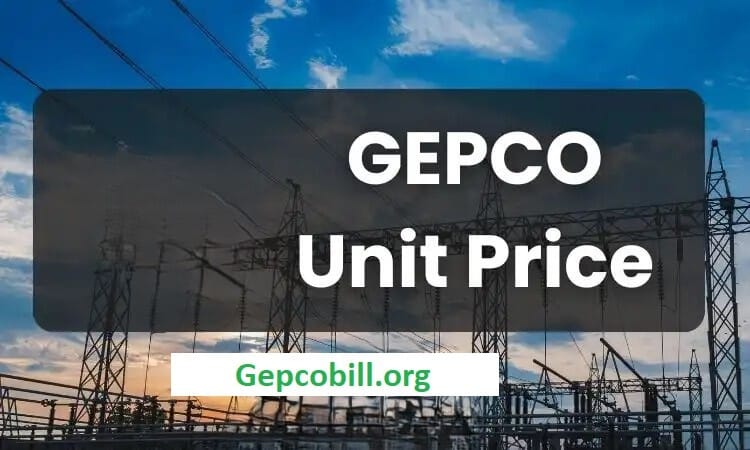GEPCO Tariff – Unit Price Today
GEPCO Unit Price 2024 Pakistan has seen a rapid and alarming increase in electricity prices, especially under NEPRA. The increase is mainly attributed to volatile currency rates and the imposition of taxes on fuel and petrol and is driven by the terms of the IMF bailout package.
Exchange rate fluctuations have directly affected the cost of power generation. At the same time, increased taxes on fuel have increased the overall cost structure of power generation, contributing to an increase in overall power prices.

Electricity Bill Per Unit Rates
Electricity prices are increasing rapidly in Pakistan. The main reason for this is inflation in currency rates. The main reason for the increase in fuel and petrol prices is the collection of taxes by the IMF the bailout package for Pakistan.
Domestic Connection Unit Price (Protected customers)
| No. | Units | Price Per Unit (Per KWH) |
| 1 | Up to 50 Units | Rs. 7 |
| 2 | 51 to 100 Units | Rs. 11.68 |
| 3 | 0 to 100 Units | Rs. 15.75 |
| 4 | 101 to 200 Units | Rs. 18.07 |
GEPCO Unit Price For Unprotected Customers
| No. | Units | Price Per Unit (Per KWH) |
| 1 | 1 to 100 | Rs. 7 |
| 2 | 101 to 200 | Rs. 11.68 |
| 3 | 201 to 300 | Rs. 15.75 |
4 | 301 to 400 | Rs. 18.07 |
Price of Electricity Commercial Per Unit
| No. | Load Type | Price Per Unit |
| 1 | Less then 5KW | Rs. 38.82 |
| 2 | Grater then 5KW | Rs. 40.26 |
As determined by GEPCO (Gujranwala Electric Power Company), this is a matter of concern for both consumers and policymakers.
Pakistan has seen a rapid and significant increase in electricity prices, because of the multifaceted factors that warrant a comprehensive examination.
GEPCO Unit Price, High Without Cause
One of the main factors contributing to the increase in electricity prices in Pakistan is the pronounced fluctuation in the currency exchange rate.
The Pakistani rupee has fluctuated in recent years, which has a direct impact on the cost of power generation.
Dependence on imported fuel and machinery for power generation. Combined with the import nature of the energy sector, it is sensitive to exchange rate fluctuations.
Depreciation of the rupee against major international currencies has fueled the buying. High cost of inputs required in the power generation process;
such as fuel and supplies, thereby putting upward pressure on electricity prices.
GEPCO Unit Price after Economic Crisis
Another important reason for the increase in electricity prices in Pakistan is the imposition of taxes on fuel and petrol.
This tax policy is a direct result of Pakistan’s determination to meet the conditions. and agreed upon in exchange for a bailout package by the International Monetary Fund (IMF).
Pakistan’s dire economic situation necessitated an IMF bailout package. The bailout package included a series of structural adjustments to stabilize the country’s economy.
To comply with the terms of the IMF agreement, the government has resorted to increasing taxes on various items. including fuel and petrol, as a means of generating income.
Unfortunately, this policy has had a huge impact on the energy sector. High taxes have increased the cost of power generation and distribution.
Moreover, rising fuel and petrol prices directly affect the cost structure of power generation in Pakistan.
The energy sector in Pakistan relies heavily on fossil fuels, particularly natural gas and oil, for power generation.
Fluctuations in global oil prices significantly affect the overall cost of power generation.
The global oil market has experienced considerable volatility in recent years. Driven by geopolitical tensions, supply disruptions, and changing demand patterns.
Future GEPCO Unit Price
As a result, Pakistan has found itself suffering from high fuel prices. When translated into the production cost of electricity, the prices contribute to the overall increase in electricity prices.
The confluence of these factors has created a difficult situation for both consumers and the government of Pakistan.
High electricity prices strain household budgets, inhibit industrial growth, and become a major obstacle to economic growth.
Moreover, the government faces the complex task of balancing fiscal responsibility with ensuring affordability. and reliable access to electricity for its citizens.
In response to these challenges, the Pakistani government has initiated several initiatives to mitigate the impact of rising electricity prices.
These measures include efforts to stabilize the currency exchange rate. They diversify the energy mix by investing in renewable energy sources. And find ways to reduce the tax burden on fuel and petroleum products.
Tax on Fuel and Petition
➤ Rising taxes on petrol-diesel due to bailout deal requirements from IMF
➤ Major impacts on the cost structure of the power sector
➤ Pakistan’s generation is heavily dependent on gas, and furnace oil.
➤ Fluctuations in global oil prices also weigh on production costs.
➤ Taxes further increase prices.
You can calculate your electricity bill with the GEPCO Bill Calculator.
Consequences for Stakeholders
Rising electricity rates in Pakistan have significant economic implications. Households face high monthly electricity bills, putting pressure on personal budgets. Industries struggle with rising energy costs, undermining their competitiveness. It is a major obstacle to national economic growth and development.
Government's Corrective Measures
➤ Efforts are underway to stabilize the currency exchange rate.
➤ Investing in renewable energy projects to diversify production
➤ Exploration of the possible reduction in petroleum tax
The way Forward
Effectively dealing with currency fluctuations and fuel taxes is critical to reducing cost pressures on power companies like GEPCO. Policymakers face the difficult balancing act of ensuring energy affordability while maintaining fiscal discipline. Targeted reforms in currency and energy tax policies can provide substantial relief.
Conclusion
Reflecting the interaction on unit rates of electricity in Pakistan for 2023. This includes currency exchange rate liberalization and tax policies formulated by international financial institutions such as the IMF.
The nation is struggling with a delicate and difficult task. A balance between economic stability and access to affordable energy.
While Pakistan is supporting them, from a multilateral perspective that prioritizes fiscal prudence. and public welfare in pursuit of a sustainable energy pricing strategy.
